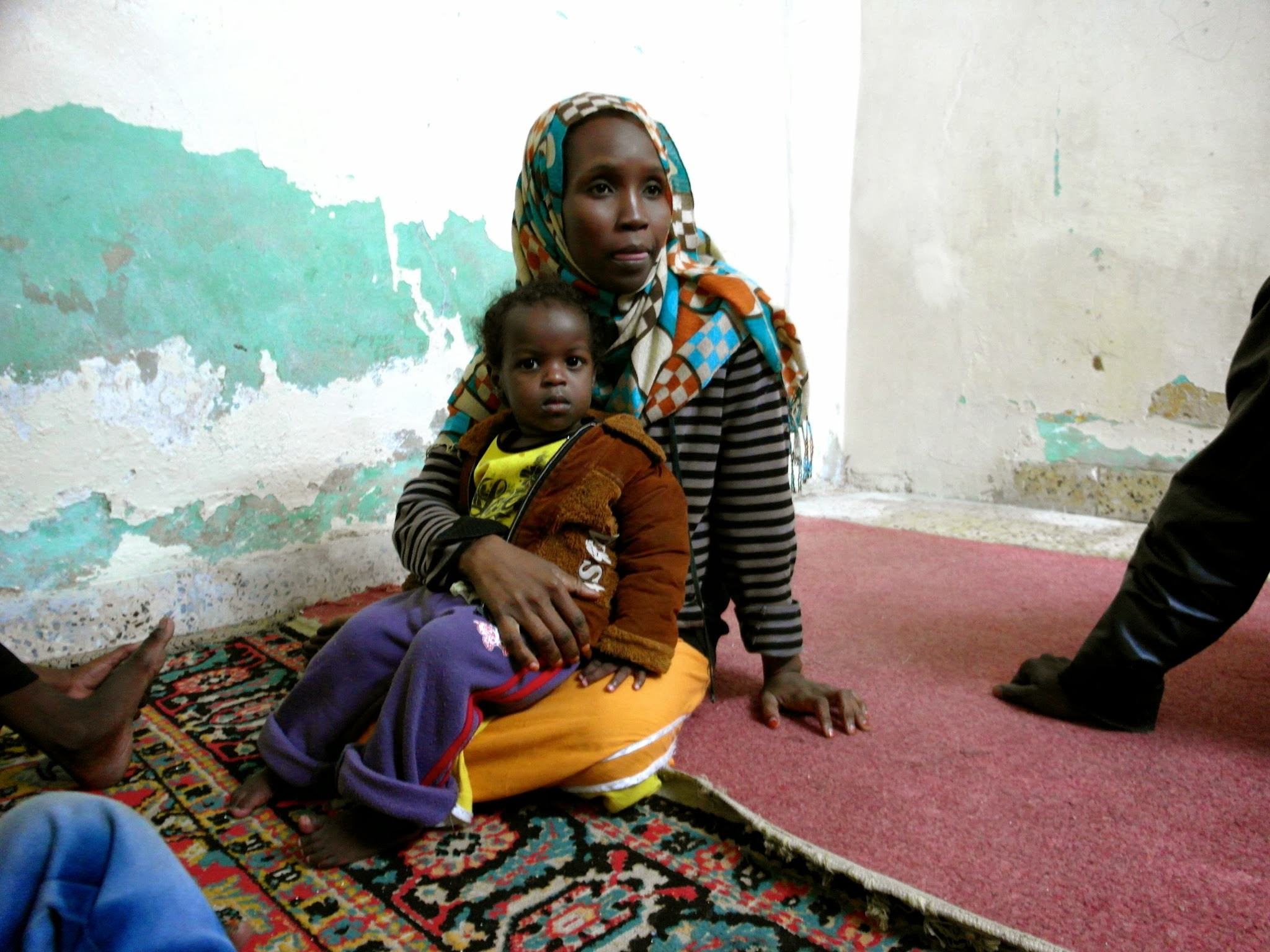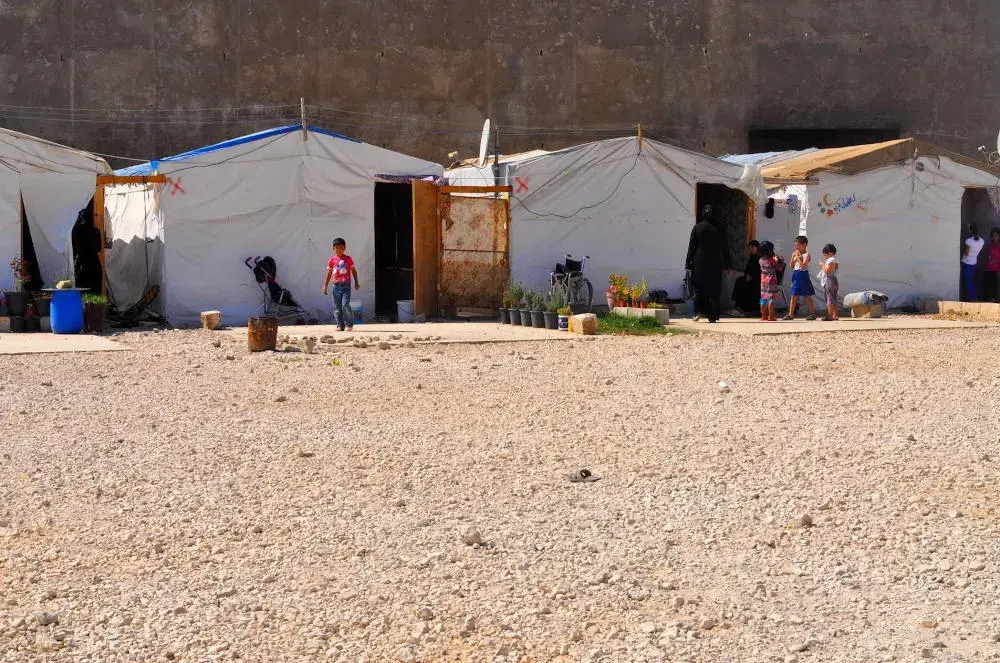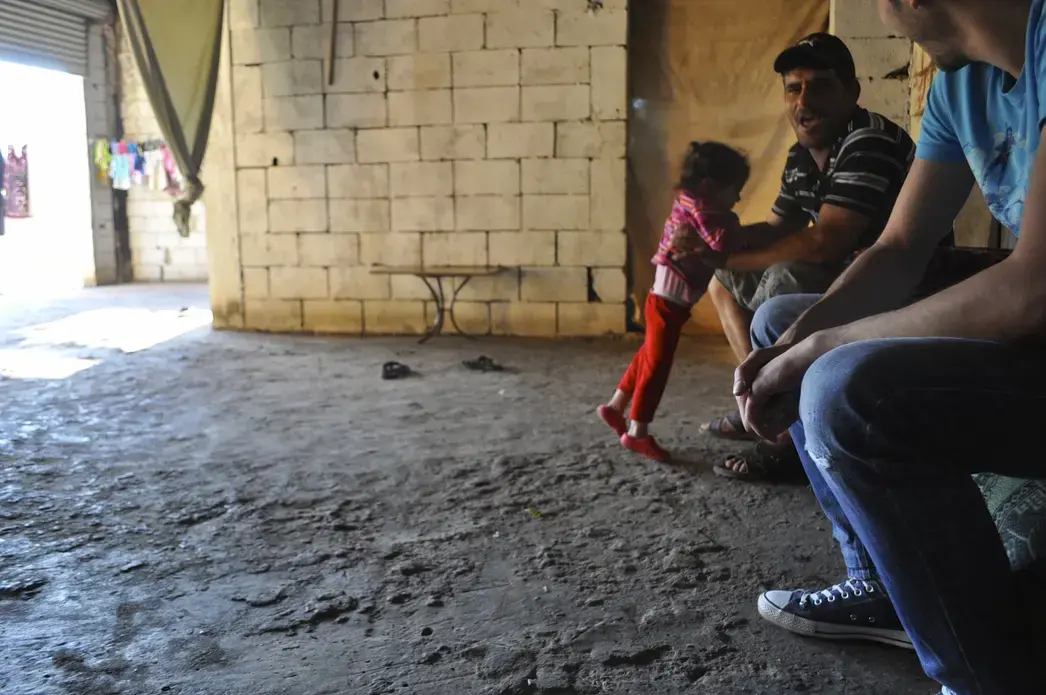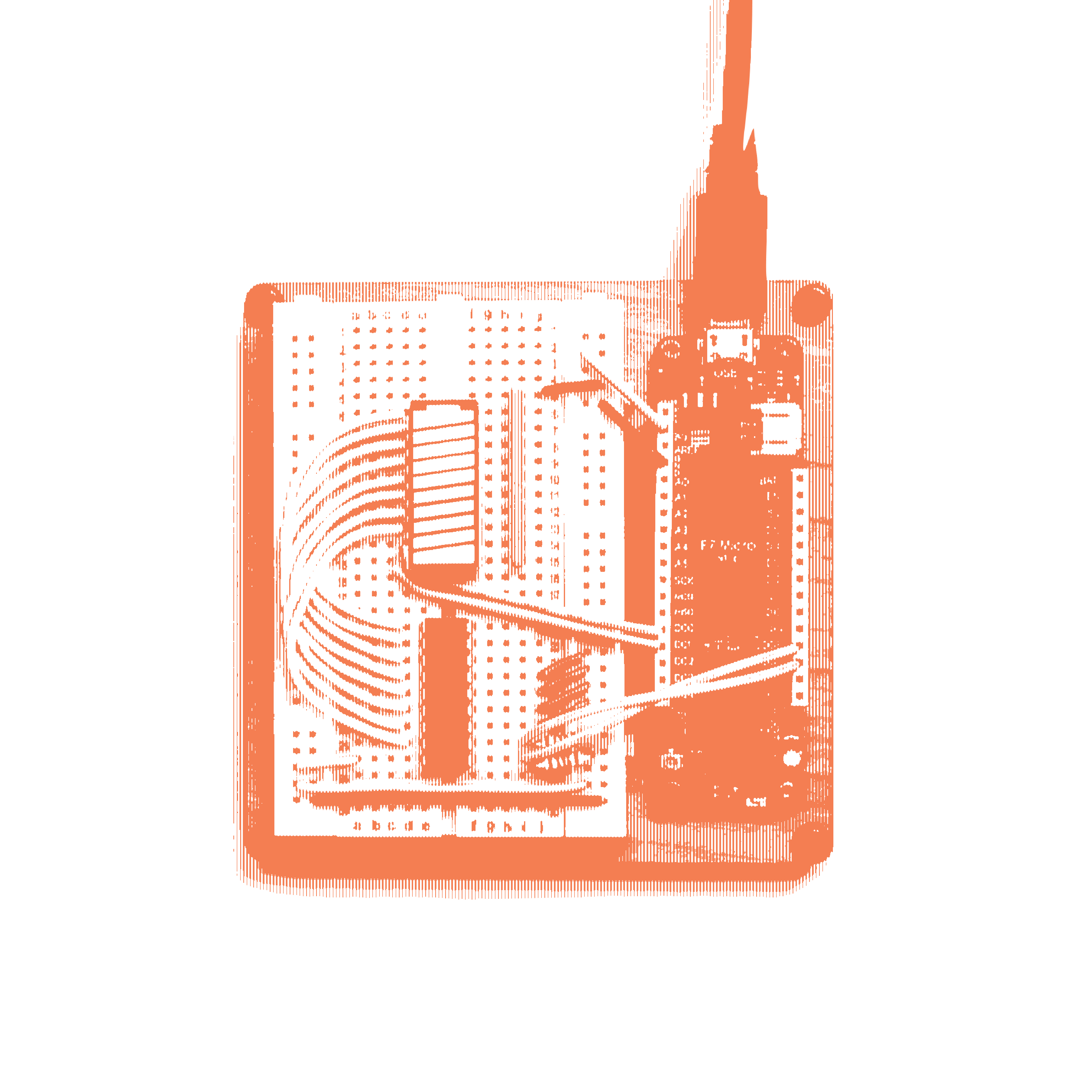Mohamad drives with one hand, squinting at the afternoon sun as his phone rings for the fifth time in the past half an hour. The lanky 25-year-old Syrian shrugs the mobile to his ear with one shoulder, scribbling numbers on a Post-it as he repeats them out loud: "$1,000 to Tripoli; $200 to Hiba's family; $300 to Umm Hanan; $10,000 for the operation."
We're in eastern Lebanon, a 90-minute drive from Beirut, a one-hour drive from Damascus, and just five minutes from the Syrian border. Sun beats through the windshield as we thread through the Bekaa Valley, an area known for its poverty, high crime rates, sectarian tensions, and, since 2011, hundreds of thousands of Syrian refugees. I watch Mohamad count out $10,000 in cash.
"It's for an open-heart surgery," he tells me. "It took us three months to raise $14,500 for this kid. The operation is tomorrow. Alhamdulillah."
Lebanon, a poor country of just 4 million people, is currently hosting 1.5 million Syrian refugees. There are another 40,000 Palestinians in Lebanon who are double refugees, having first fled to Syria before being forced by fighting to cross the border. Most refugees cluster in impoverished areas like Bekaa, joining the 25 percent of all Lebanese citizens who live on less than $4 a day. Barred by Lebanese authorities from building official camps, the United Nations High Commissioner for Refugees (UNHCR) struggles to reach refugees scattered in urban areas and makeshift tent settlements on rented plots of land.
The World Bank predicts 170,000 more Lebanese will dip below the poverty line this year. Wages continue to fall, electricity and water is cut off for days at a time, and social tensions are on the rise. Violence has spilled over from Syria, especially in places like Arsal — home to 42,000 refugees — where clashes between the Lebanese Army and Syrian militants last week displaced 800 Lebanese and Syrian families. Many Lebanese resent the Syrian presence, and don't distinguish between militants and victims of Syria's ongoing crisis.
Mohamad is part of a Syrian volunteer team trying to fill the massive gaps left by inadequate international aid. Its 40-plus members — they're not affiliated with or themselves an NGO to avoid red tape — raise money via social media from private donors who are mostly Syrian expatriates in Europe, America, and the Gulf for refugees without access to UN or NGO aid in Jordan, Turkey, and Lebanon.
Their media team is all female, five Syrians living in the Gulf who receive case descriptions and publicize them on the group's Facebook page. Donations are organized from Amman and sent via Paypal or Western Union to field workers like Mohamad who pick up the cash, distribute it, take photos to use in subsequent fundraising, and report back. There's no physical office in Lebanon. Instead, the team coordinates everything via Facebook.
Everyone on the team is a refugee. Their average age is 25. Many fled Syria alone. No one gets paid.
* * *
It's the last week of Ramadan. Driving erratically, Mohamad goes quickly from the Syrian border to a Western Union to a pharmacy to a falafel place. He picks up cash and drops it off. He delivers medicine and boxes of pastries for children to eat for iftar. Phone messages and calls come in constantly: from a family asking if he's coming to see them, from a taxi driver who's smuggled passports across the border, from his mother asking him to pick up bread. At that, Mohamad laughs.
He visits a woman whose daughter has a variety of serious medical issues; she's deaf and can barely see. Kneeling in a dark room, the 14-year-old girl has smooth skin and hair neatly tucked behind her ear. She'd attended a school for disabled children and received medical attention in Syria. Then the fighting began.
Here, her treatment costs $250 per month. Her mother is alone and cannot work. They've recently been deactivated from UNHCR aid, meaning they don't get assistance for rent or food, although 75 percent of their medical fees — the girl requires regular dialysis — are still subsidized.
The family is in debt to the hospital. Blood treatment can't wait, so they gave the doctor their identity cards as guarantee of paying eventually. Once they get the cards back, they'll try going back to Syria for cheaper treatment, the mother tells me.
Mohamad leaves them $200. "Inshallah we'll bring more next month," he says.
More than 45,000 Syrians have been deactivated from UNHCR this year and can no longer access UN humanitarian aid. Refugees may have their UNHCR files deactivated when they fail to show up for document renewal, miss three rounds of food assistance, or are otherwise "found not to be in need of international protection."
That can happen if they cross back and forth into Syria. Syrians must be "unable or unwilling to return to Syria due to a well-founded fear of persecution" to qualify as refugees, according to UNHCR registration criteria developed with Lebanon's government. Any Syrians who go back to Syria — to, say, renew their passports so that they can legally remain in Lebanon — thus risks having their files deactivated. They're still registered as refugees, but lose access to aid. Reactivation is possible, but too much cross-border movement may disqualify them for refugee status altogether.
Even those who are registered, though, aren't guaranteed aid. Cases are treated individually based on vulnerability and available funding. UNHCR has received only 29 percent of its $1.5 billion appeal for Syrian refugees in Lebanon this year. The World Food Program now offers its food assistance — $30 per person per month — to only 7 out of 10 refugees because there aren't enough resources available to give it to all of them.
Almost four years since the fighting began in Syria, the refugee situation is worse than ever. In Beirut, one UN worker tells me about driving a car filled with clothing donations for refugees when she first came to Lebanon. In the north of the country, she encountered a Syrian man who had arrived in the country that day. He was a veterinarian, and it had taken him three days of traveling through Syria to reach the border.
"I performed 21 amputations in those three days," the man told her. His only medical experience was with animals, but there was nobody else to perform the operations. "My son died [due to shelling] while I was doing the amputations," he continued, tears running down his face. "My 19-year-old son."
The aid worker told me, "I had bags of clothes. What the hell were they going to do?"
* * *
In southern Beirut's Shatila Camp — it has housed Palestinian refugees since 1949 and was the scene of a bloody massacre in 1982 — the cramped streets smell of sewage. Black clusters of impossibly tangled electric wires hang overhead. About 10,000 Palestinians live on top of one another within a half a square mile here. That's not including the thousands of newly arrived Syrian refugees.
Fadi Halliso came to Lebanon in 2010. Having once trained to be a Jesuit priest, he founded Basmeh and Zeitooneh, a development NGO that runs a women's handicrafts workshop in Shatila. "People are tired of aid organizations coming in and out — you can't count on donations forever," Halliso says. "We need to create job opportunities for refugees to help themselves."
The hardest thing about creating livelihoods, Halliso says, is that you can't create enough. Several months ago, the NGOs in Shatila announced a hiring call for drivers. Fifteen people applied, but there were only three openings. One of the men who didn't receive a job then came to Basmeh and Zeitooneh's office with a gun, yelling threats at the staff.
What happened? "We shouted at each other and then we hugged," Halliso says. "People are deeply wounded, living without the right to work or be human. I can't be angry at someone like this."
In the meantime, Basmeh and Zeitooneh tries to empower refugees through collective employment. The women sit on the floor, telling me how their husbands were shot, their homes have no power, and their children have no schools to attend. But they do so while weaving scarves and cushion covers, making an income. "The most dangerous thing is to leave people to despair," Halliso says. "What's happening is bigger than us. But on a micro level, we can do a lot."
* * *
That night, Mohamad texts, The boy died in the operation.
Mohamad also sends pictures: a selfie with the 6-year-old in the car that morning, the kid laughing in the hospital hallway — and then lying on a hospital bed. Mohamad will drive the family home with the body early tomorrow morning. Then he'll go back to sort out the hospital papers.
Two days later, Mohamad spends the last night of Ramadan with his own family, and they stay up until the Eid al-Fitr prayer sounds. Mohamad's brother Abdullah has two daughters, 2-year-old Souad and 5-year-old Nadeen, who flounce on the couch watching Tom & Jerry on Cartoon Network Arabia.
After the girls are asleep, we bring an argileh [hookah] outside and talk. Abdullah works at a fruit stand with two other Syrians, Mostafa and Fadi. They collectively make $2,000 a month; Abdullah gets $100, Fadi gets $500, and Mostafa keeps the rest. He's the only one with a work permit — something that's impossible for Abdullah to obtain because of his affiliation with the Free Syrian Army; for two years, he smuggled medical supplies across the border. Mostafa knows he wouldn't be able to find work anywhere else.
Nadeen's Lebanese school costs $1,000 a year. Abdullah's rent is $450 a month for four people living in a 200 square foot space. They haven't had running water for five weeks. But for Syrian refugees in Lebanon, the family is doing relatively well — they've lived for two years off proceeds from selling a house and most of their land in Syria. But now that money is running out; the family is down to their last $200.
A few days later, violence explodes in northern Bekaa. Thousands of refugees are trapped for days without food, electricity, or medical access amid bombardment between Hezbollah, Syrian militants, and Lebanese Army units. Six refugee camps are completely burned down, according to a statement by Lebanon's Union of Relief and Development Associations, and nine others severely damaged by shelling.
The situation is miserable, writes Tarek, a 28-year-old Syrian living in Arsal, in a message to Mohamad's team. There are 25 refugee camps that were caught in crossfire. People are homeless, some are dead, refugees are displaced again. We need shelters, medicine, and food.
Mohamad's team issues an emergency appeal. But the never-ending cycle of violence and need is clearly getting to Mohamad, who was in his last year of college when the fighting began in Syria.
"I haven't had school or work for four years — I can't volunteer forever," he says. "What should I do?"










